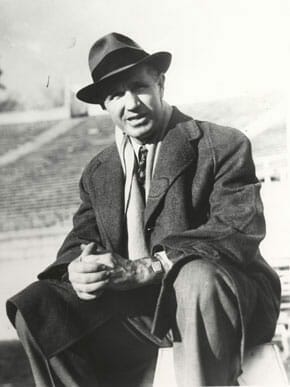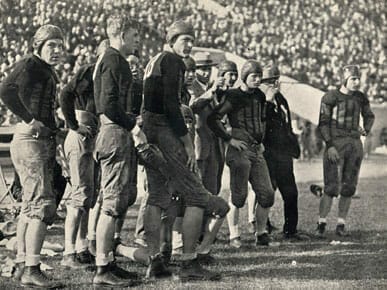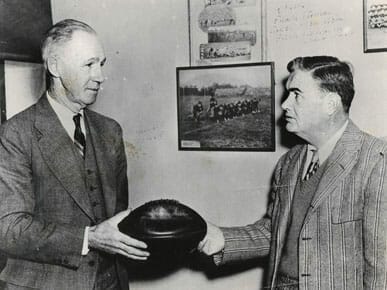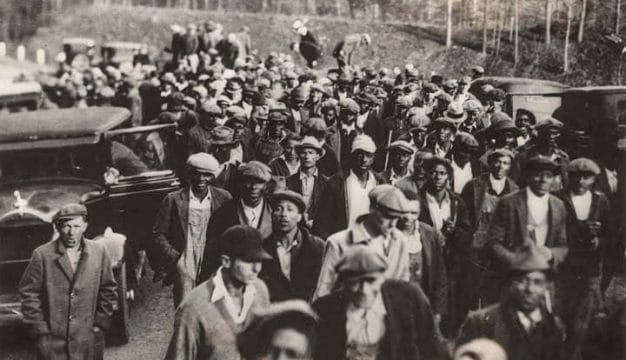Wallace Wade
Wallace Wade (1892-1986) is considered one of the greatest coaches in the history of college football. He is credited with promoting southern football nationwide by building powerhouses at the University of Alabama and Duke University in North Carolina. Wade led three Alabama teams to national championships and took three Alabama teams and two Duke teams to the prestigious Rose Bowl.
Wade was born in Trenton, Tennessee, on June 15, 1892, into a farming family. His parents were Robert Bruce Wade and Sallie Ann Mitchell, and he had five brothers and three sisters. Wade attended Peabody High School in Trenton, where he played football for the first time under coach Tuck Faucett.
 Wade, Wallace
Wade entered Brown University in 1913, where he played guard for the Brown Bruins (now the Bears). The successful team played in the 1916 Rose Bowl game, losing to the Washington State Warriors (now the Cougars). After graduating from Brown in 1917, Wade became head coach at Fitzgerald and Clark Military School in Tullahoma, Tennessee. In two seasons at Fitzgerald and Clark, Wade’s teams won 16 games, lost only 3, and won the Tennessee state prep-school championship in 1920.
Wade, Wallace
Wade entered Brown University in 1913, where he played guard for the Brown Bruins (now the Bears). The successful team played in the 1916 Rose Bowl game, losing to the Washington State Warriors (now the Cougars). After graduating from Brown in 1917, Wade became head coach at Fitzgerald and Clark Military School in Tullahoma, Tennessee. In two seasons at Fitzgerald and Clark, Wade’s teams won 16 games, lost only 3, and won the Tennessee state prep-school championship in 1920.
In 1921, Wade was hired as an assistant coach at Vanderbilt University. During his two years there, the football team won two Southern Conference championships and never lost a game, finishing 15-0-2. This record led other southern schools to become interested in Wade, and eventually both the University of Kentucky and the University of Alabama (UA) offered him jobs as head coach.
Wade chose UA and became the head football coach there in 1923. During his tenure, the Alabama Crimson Tide established itself in national football circles, winning 61 games against only 13 losses. Wade also led the team to its first four conference championships and first three national titles. In 1925, Alabama finished the
 Wade, Wallace
regular season 9-0 and outscored its opponents 277-7. The following year, Alabama was invited to play in the 1926 Rose Bowl against the University of Washington. Alabama was a heavy underdog but won 20-19. Paul W. “Bear“ Bryant, later the most famous name in Alabama football history, credited Wade for establishing the University Alabama as a football powerhouse.
Wade, Wallace
regular season 9-0 and outscored its opponents 277-7. The following year, Alabama was invited to play in the 1926 Rose Bowl against the University of Washington. Alabama was a heavy underdog but won 20-19. Paul W. “Bear“ Bryant, later the most famous name in Alabama football history, credited Wade for establishing the University Alabama as a football powerhouse.
Many college football historians agree that Alabama’s Rose Bowl victory was the most important game in southern football history. Before 1925, football programs in the South were considered mediocre in comparison with those in other parts of the country. A stigma of inferiority was attached to southern teams because the South had a historical legacy of military defeat, poverty, and cultural alienation from the rest of the country. This victory raised the profile of the South as a region that was on the move.
 Paul “Bear” Bryant
Wade led Alabama to a national championship and Rose Bowl tie in 1927 and won another national title in 1930. During that same season, Alabama outscored its nine regular-season opponents 247–13 and defeated Washington State 24–0 in the 1931 Rose Bowl. Bear Bryant, who grew up in Arkansas, chose to attend and play football for UA largely because of what Wade had accomplished. The prestige gained from the 1926 and 1927 Rose Bowl wins enabled the school to collect enough funds to construct Denny Stadium (now Bryant-Denny Stadium). Wade also picked his successor, Frank Thomas, who went on to coaching greatness at Alabama.
Paul “Bear” Bryant
Wade led Alabama to a national championship and Rose Bowl tie in 1927 and won another national title in 1930. During that same season, Alabama outscored its nine regular-season opponents 247–13 and defeated Washington State 24–0 in the 1931 Rose Bowl. Bear Bryant, who grew up in Arkansas, chose to attend and play football for UA largely because of what Wade had accomplished. The prestige gained from the 1926 and 1927 Rose Bowl wins enabled the school to collect enough funds to construct Denny Stadium (now Bryant-Denny Stadium). Wade also picked his successor, Frank Thomas, who went on to coaching greatness at Alabama.
Wallace Wade left Alabama for the head coaching position at Duke University in 1931. Success followed Wade to Duke. He won 110 games with only 36 losses in his 16 years leading the Blue Devils. Wade coached Duke to Rose Bowl games in 1939 and 1942, but lost both. His 1938 team, however, not only was unbeaten during the regular season, it did not allow a single one of its nine opponents to score a point.
 Wade, Wallace
Shortly after the 1942 Rose Bowl, Wade resigned as Duke coach to volunteer for the U.S. Army at age 49. He eventually was promoted to lieutenant colonel and led the 272nd Field Artillery Battalion in the Battle of Normandy and the Battle of the Bulge and during the Ninth Army’s drive through Germany. Wade was awarded a Bronze Star and four battle stars, and the French government awarded him the Croix de Guerre (Cross of War) with Palm, a very high honor for heroism. Wade returned to his coaching job at Duke in 1946 after World War II ended. Wade’s first wife, Frances Bell, died in 1947, and he was remarried in 1950 to Virginia Jones. He coached the Blue Devils through the 1950 season and then was appointed commissioner of the Southern Conference, a position he held until 1960. Having grown up on a farm, Wade retired to his cattle farm in Durham in 1960. In 1970, Wade was inducted into the Alabama Sports Hall of Fame.
Wade, Wallace
Shortly after the 1942 Rose Bowl, Wade resigned as Duke coach to volunteer for the U.S. Army at age 49. He eventually was promoted to lieutenant colonel and led the 272nd Field Artillery Battalion in the Battle of Normandy and the Battle of the Bulge and during the Ninth Army’s drive through Germany. Wade was awarded a Bronze Star and four battle stars, and the French government awarded him the Croix de Guerre (Cross of War) with Palm, a very high honor for heroism. Wade returned to his coaching job at Duke in 1946 after World War II ended. Wade’s first wife, Frances Bell, died in 1947, and he was remarried in 1950 to Virginia Jones. He coached the Blue Devils through the 1950 season and then was appointed commissioner of the Southern Conference, a position he held until 1960. Having grown up on a farm, Wade retired to his cattle farm in Durham in 1960. In 1970, Wade was inducted into the Alabama Sports Hall of Fame.
Wade died on September 23, 1986, in Durham, North Carolina, at the age of 94. Wallace Wade Drive now runs alongside Bryant-Denny Stadium at the University of Alabama and a statue of Coach Wade was erected in front of the stadium in 2006 along with those of Frank Thomas, Paul Bryant, and Gene Stallings. Wallace Wade Stadium is now the home football field for Duke University, and Coach Wade is enshrined in the College Football Hall of Fame, receiving his just due as one of the greatest football coaches in college football history.
Additional Resources
Bowling, Lewis. Wallace Wade: Championship Years at Alabama and Duke. Durham, N.C.: Carolina Academic Press, 2006.
Scott, Richard. Legends of Alabama Football. Champaign, Ill.: Sports Publishing, 2004.



